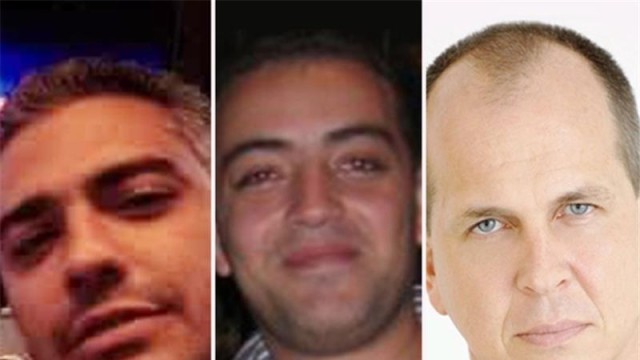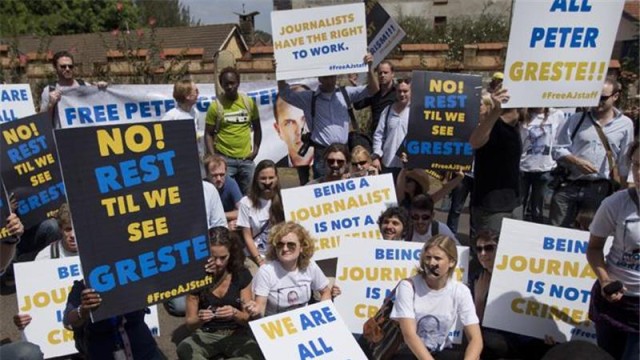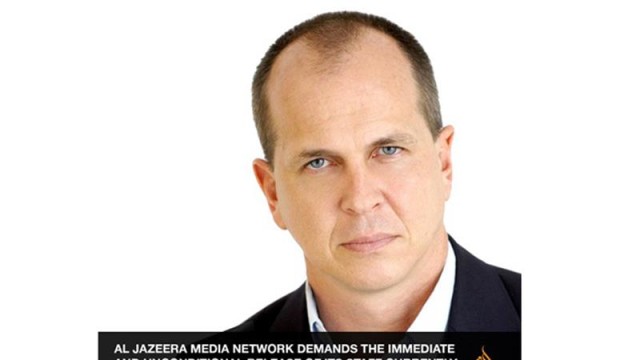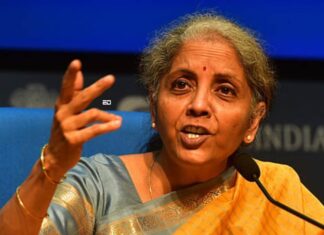“A free Press can of course, be good or bad, but, most certainly without freedom, the press will never be anything but bad “-Albert Camus.
The Al Jazeera Journalist Peter Greste, who was imprisoned in Cairo for 400 days, has been released by Egyptian Authorities on 2nd February, 2015. Correspondent Peter Greste, Producer Mohammed Fahmy and Baher Mohammed of Al Jazeera were arrested on December 29,2013 and charged with reporting news that was “damaging to national security”, an allegation Al Jazeera denies. Mohammed was given three more years for being in possession of a spent bullet casing he found at a protest.
Courageous Journalism Under Fire:
After the military takeover in Egypt on 3rd July,2013, several international media outlets came under pressure, most notable of which was Al Jazeera which has experienced systematic attacks, intimidation, arrests and confiscation of property since the military coup in July,2013.
The journalists say they were doing their jobs when detained. Their imprisonment reinforced the view of human rights groups that the government was rolling back freedoms gained after the 2011 uprising that toppled autocrat Hosni Mubarak.
Journalists Urge Freedom:
The protest was organised by the Foreign Correspondents Association of East Africa.
Anger over the incarceration of journalists in Egypt poured onto the streets of the Kenyan capital. When they eventually got to see the officials, the protesters handed them books and an open letter written to Al Jazeera’s East Africa Correspondent, Peter Greste. In the letter, the protesters wrote messages of goodwill and support to Peter and his colleagues. However, embassy staff declined to receive them.
‘You silence one of us, you silence us all’ :
Organisers of the protests also launched a social media campaign so that those who couldn’t make it to the demonstrations could join the protest. They asked journalists worldwide to tweet or Facebook a picture of themselves with their mouths taped or gagged.
The message? “You silence one of us, you silence us all.”
Al Jazeera denies the allegations against its journalists and has condemned their continuing detention, along with the United Nations, international rights groups and news media figures.
Peter Greste letter from Egyptian jail:
Award winning foreign correspondent Greste, spoke of his fears over writing the letter, but said that he had made the decision that remaining silent and fighting his imprisonment from within “validates an attack not just on me and my two colleagues but on freedom of speech across Egypt.”
In a letter written on paper passed to him by people in his neighbouring cells, Greste wrote of the way in which his Egyptian colleagues were being held.
“Fahmy and Baher have been accused of being Muslim Brotherhood members, so they are being held in the far more draconian “Scorpion prison” built for convicted terrorists.
“Fahmy has been denied the hospital treatment he badly needs for a shoulder injury he sustained shortly before our arrest. Both men spend 24 hours a day in their mosquito-infested cells, sleeping on the floor with no books or writing materials to break the soul- destroying tedium.”
The prosecutor general has already extended the initial 15-day detention by another 15 days, a tactic that can be indefinitely employed, keeping the men behind bars without charge. On 23rd January, US Senator John McCain openly condemned the continued detention of the journalists, calling it a clear violation of press freedom.
Peter’s letters from inside Cairo’s Tora prison have given the world some insight into what he must be going through. Peter has managed to remain steely and magnanimous at the same time.
Leading human rights lawyer criticises Western governments:
One of the world’s leading human rights lawyer, Geoffrey Robertson has condemned Western governments for failing to put enough pressure on Egypt to free three Al Jazeera journalists who have spent 400 days in a Cairo prison. He told Al Jazeera on 1st february,2015 that it was hypocritical of so many leaders to stand up for media freedoms over the Charlie Hebdo magazine killings in Paris while turning a blind eye to the same issue in Egypt.
“The success of the Egyptian tactic of locking up these journalists with lickspittle judges who do whatever the government wants and are keeping them in jail is likely to be followed by other autocratic regimes,” the British lawyer said.
“Good News but not enough”:
In a statement, the network said the campaign to free its journalists in Egypt would not end until all three had been released.It said that all three have to be exonerated, and the convictions against its other journalists tried in absentia also have to be lifted. Al Anstey, the Managing Director of Al Jazeera English, said he was relieved Greste had been freed and was on his way home to be reunited with his family, but spoke of the need to free Mohamed and Fahmy.
“We’ve got to focus that Baher and Mohamed are still behind bars, and several of their colleagues that were sentenced to ten years in absentia are still sentenced today,” he said on 2nd February,2015.
Watch here a video about AJE’s managing director on Peter Greste’s release:
Australia’s foreign Minister Julie Bishop said Greste flew to Cyprus from Cairo. “He was immensely relieved and he was desperate to come home to Australia and reunite with his family,” Bishop said.
She said several governments had raised Great R’s case with Egyptian authorities. “Prime Minister (Tony) Abbott spoke to President al-Sisi and we had many other governments, including in the region, make representations on Mr Greste’s behalf.”
However, the unconditional release of Peter Greste is not yet known. the question arises why now after 400 days? And Why only Peter Greste? I it that preference to a foreigner leaving behind an Egyptian national. According to Egyptian law, this is considered an extradition, said lawyer Amir Eldib “Peter must be tried in Australia and authorities there must determine if he;s guilty or not.” Does there hang a question mark after press freedom?
By Pavani Chennamasetti






































